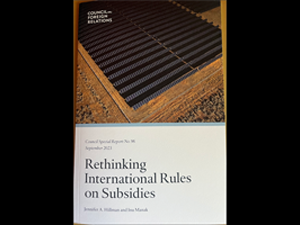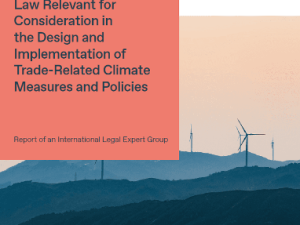Publications

Rethinking International Rules on Subsidies
CITD Co-Director Jennifer Hillman, and CFR Fellow for Trade Policy Inu Manak, have published a new report on international rules on subsidies. According to the authors, “The United States should lead the effort to reshape the global rules to better serve its own interests and the international trading system’s changing realities." The authors also contend that such an effort “would give the United States a powerful tool to address its twin concerns over competition with China and fighting climate change. It would also allow the WTO and the world to come closer to a more equitable, resilient, and sustainable international economic order.”

Report on Principles of International Law Relevant for Consideration in the Design and Implementation of Trade-Related Climate Measures and Policies
TESS, the Forum on Trade, Environment, & the SDGs, convened a diverse group of eminent legal experts, including CITD Co-Director Jennifer Hillman, to foster shared understanding of existing principles in international law that can guide policymakers when debating, designing and implementing trade-related climate measures. This report is the outcome of the expert group’s work.
The report examines a set of well-established principles of international law, identified by the expert group as particularly pertinent for shaping and executing trade-related climate measures and policies. The acknowledgment and shared understanding of these principles hold the potential to mitigate tensions and preempt politically charged disputes within the World Trade Organization (WTO). Simultaneously, fostering such shared understanding can facilitate collaborative efforts in crafting inclusive trade policies that not only align with climate action objectives but also contribute to the advancement of sustainable development goals.
Beyond underscoring the significance of these principles, the report aspires to furnish governments with comprehensive guidance. This guidance is envisioned to serve as a valuable resource in the formulation and execution of trade-related climate measures and policies. It is designed to promote coherence across various legal domains, recognizing the dynamic interplay of principles contingent upon the specific nature of the measure and the contextual backdrop. The overarching aim is to provide a framework that not only acknowledges the diverse operational landscapes but also encourages a harmonious integration of these principles, fostering a conducive environment for effective climate action and sustainable development.

International Trade Law: A Casebook for a System in Crisis
A free online international trade law casebook written and edited by Professors Henry Gao, Jennifer Hillman, Nicolas Lamp and Joost Pauwelyn is now available for free on-line.
No student, anywhere in the world, should find themselves unable to learn international trade law because textbooks are too expensive. That’s why the Geneva Trade Platform teamed up with four leading professors, including our Co-Director Jennifer Hillman, to create something brand new: a completely free, comprehensive online casebook.
The casebook is currently in its open beta version, with 16 core chapters ready and the final five chapters to be added soon. The book is now sufficiently advanced to prove potentially useful to students and teachers alike.
The possibilities and implications of this new format not only address the at-times prohibitive cost of a traditional casebook, but also allows edits and expansions of the content very quickly instead of once every few years in a new addition. Moreover, this format can ignore the space constraints a paper book implies by including a wealth of optional content, including eventually a wealth of diverse voices offering critiques, analysis and case studies and a broad range of embedded media such as videos, podcasts and external links to make the content more dynamic for students.

Using Trade Tools to Fight Climate Change
CITD is proud to announce the publication of "Using Trade Tools to Fight Climate Change", co-edited by our Co-Director Jennifer Hillman and Loriane Damian. This book is focused on practical measures that can be taken to harness the power of trade and trade tools to address climate change. Ranging from promoting the transfer of technology allowing local cement production to capture and store carbon, to using services commitments to open doors to climate migrants, to details on everything from green steel to a circular plastics economy to greenhouse gas measurement metrics to carbon clubs, the book is based on papers written by Georgetown Law students.
